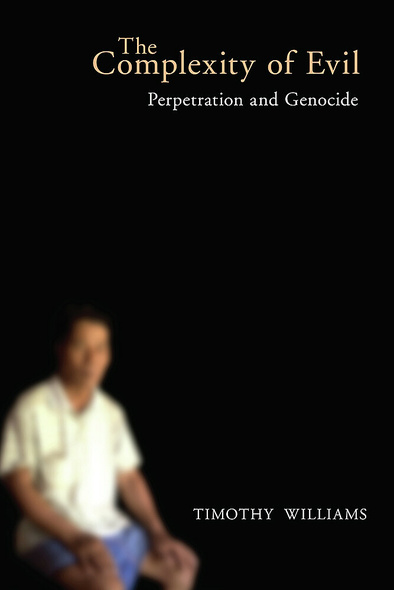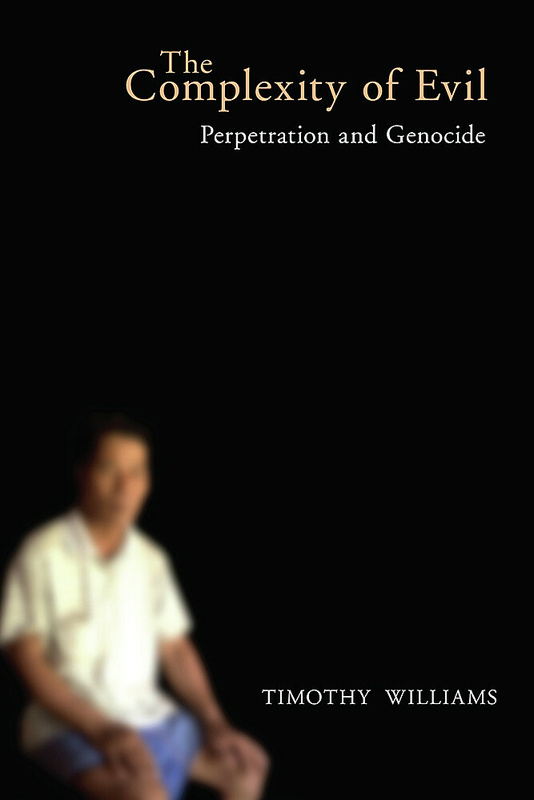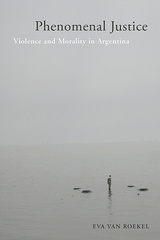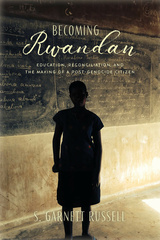Our shopping cart is currently down. To place an order, please contact our distributor, UTP Distribution, directly at utpbooks@utpress.utoronto.ca.

280 pages, 6 1/8 x 9 1/4
2 b-w images, 1 table
Paperback
Release Date:18 Dec 2020
ISBN:9781978814295
Hardcover
Release Date:18 Dec 2020
ISBN:9781978814301
The Complexity of Evil
Perpetration and Genocide
Rutgers University Press
Why do people participate in genocide? The Complexity of Evil responds to this fundamental question by drawing on political science, sociology, criminology, anthropology, social psychology, and history to develop a model which can explain perpetration across various different cases. Focusing in particular on the Holocaust, the 1994 genocide against the Tutsi in Rwanda, and the Khmer Rouge genocide in Cambodia, The Complexity of Evil model draws on, systematically sorts, and causally orders a wealth of scholarly literature and supplements it with original field research data from interviews with former members of the Khmer Rouge. The model is systematic and abstract, as well as empirically grounded, providing a tool for understanding the micro-foundations of various cases of genocide. Ultimately this model highlights that the motivations for perpetrating genocide are both complex in their diversity and banal in their ordinariness and mundanity.
Download the open access ebook here.
Download the open access ebook here.
Confronting the most challenging moral and historical questions in our field, The Complexity of Evil is exceptionally insightful and wise. Based upon extensive research and deep thought, this book is also remarkably accessible. Williams never loses sight of the human implications of his study, and has made a pathbreaking contribution.’
The Complexity of Evil is a thorough and systematic exploration of genocide perpetration that that marries conceptual precision with a nuanced exploration of the Cambodian Genocide and other case studies. In perhaps his greatest contribution, Williams avoids reproducing conventional wisdom by thoughtfully exploring the complexities of perpetrator motivations in each context.'
This timely book—grounded in extensive qualitative fieldwork in Cambodia and comparison with the Holocaust and the 1994 Rwandan genocide—offers rich insights for the fields of perpetrator studies and genocide studies. Williams’s complexity of evil model helps us better understand the personal circumstances through which people become perpetrators, while acknowledging the potential for them to simultaneously be victims, bystanders, rescuers, and so on.'
Confronting the most challenging moral and historical questions in our field, The Complexity of Evil is exceptionally insightful and wise. Based upon extensive research and deep thought, this book is also remarkably accessible. Williams never loses sight of the human implications of his study, and has made a pathbreaking contribution.’
The Complexity of Evil is a thorough and systematic exploration of genocide perpetration that that marries conceptual precision with a nuanced exploration of the Cambodian Genocide and other case studies. In perhaps his greatest contribution, Williams avoids reproducing conventional wisdom by thoughtfully exploring the complexities of perpetrator motivations in each context.'
This timely book—grounded in extensive qualitative fieldwork in Cambodia and comparison with the Holocaust and the 1994 Rwandan genocide—offers rich insights for the fields of perpetrator studies and genocide studies. Williams’s complexity of evil model helps us better understand the personal circumstances through which people become perpetrators, while acknowledging the potential for them to simultaneously be victims, bystanders, rescuers, and so on.'
TIMOTHY WILLIAMS is a junior professor of insecurity and social order at the Bundeswehr University Munich in Munich, Germany. His work has won awards from the International Association of Genocide Scholars, the German Peace Psychologist Association, and Marburg University. He is the coeditor, with Susanne Buckley-Zistel, of Perpetrators and Perpetration of Mass Violence: Action, Motivations and Dynamics.
Contents
List of Abbreviations
Introduction
Vignette 1 Chandara: a fearful volunteer enters the tiger zone
1 The complexity of evil – introducing the model
Vignette 2 Sokong: a coerced killer with a conscience
2 Motivations
Vignette 3 Sokphary: a female unit leader with a sense of responsibility for her subordinates
3 Facilitative factors
Vignette 4 Sopheak: an interrogator searching to unearth enemy strings
4 Contextual conditions
Vignette 5 Sokha: a child guard the regime turned on
5 Diversity, complexity, scope – discussing the model and its empirical application
Vignette 6 Ramy: a garment worker participating in the evacuation of Phnom Penh
Conclusion
Appendix: List of interviewees
Acknowledgments
Glossary
Bibliography
Index
List of Abbreviations
Introduction
Vignette 1 Chandara: a fearful volunteer enters the tiger zone
1 The complexity of evil – introducing the model
Vignette 2 Sokong: a coerced killer with a conscience
2 Motivations
Vignette 3 Sokphary: a female unit leader with a sense of responsibility for her subordinates
3 Facilitative factors
Vignette 4 Sopheak: an interrogator searching to unearth enemy strings
4 Contextual conditions
Vignette 5 Sokha: a child guard the regime turned on
5 Diversity, complexity, scope – discussing the model and its empirical application
Vignette 6 Ramy: a garment worker participating in the evacuation of Phnom Penh
Conclusion
Appendix: List of interviewees
Acknowledgments
Glossary
Bibliography
Index






